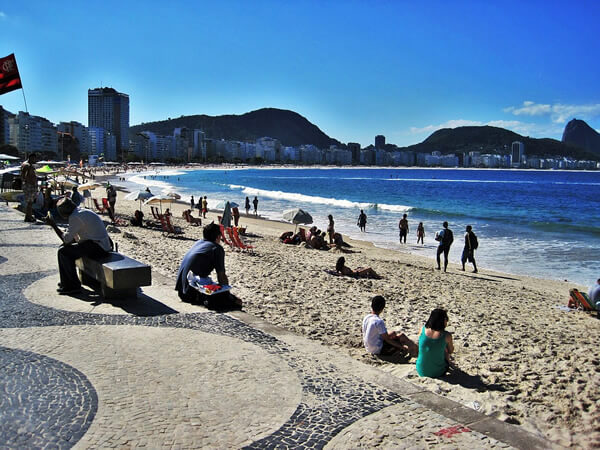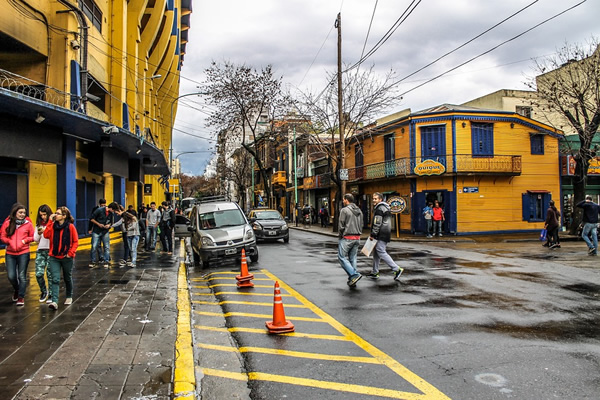4 Safety Tips for Independent Travel in South America
By Volker Poelzl

|
|
Relax at the Copacabana beach in busy Rio de Janeiro bit still keep an eye out.
|
Although most foreigners travel safely in South America, travelers should be aware of the safety risks they might face during their trip. South American countries are developing nations with widespread social disparities encouraging petty crime. Foreigners, regardless of whether they are wealthy tourists or backpackers, are widely considered wealthy compared to the locals, which puts them at a higher risk of being targets of petty crime and rip-off schemes. But suppose you inform yourself before you go and watch your surroundings as you travel. In that case, you will have a safe and enjoyable trip to South America. The following travel tips are based on my experiences from my extensive travels across South America. I advise you to explore this fascinating continent while taking a few basic safety precautions.
1. Know Safety Precautions Before You Travel to South America
The best way to prepare yourself is to be well-informed about the current political and economic situation, which often indicates a country's overall safety and stability. Search the web for reports on strikes, protests, and civil unrest in the South American country of interest to you, and also look for news about transportation safety. Airplane and bus accidents occur more frequently in South America than North America or Europe, mainly due to bad road conditions and a poorly maintained fleet of buses and airplanes.
Government travel warnings should also be considered, and you should check the State Department or Department of Foreign Affairs website of your home country for any recent events that might affect travelers. Before entering remote areas, register with your embassy or consulate and inquire about safety risks. Keep their phone number and address handy in case of an emergency. It is also helpful to read the local newspapers or a locally published English-language publication to stay abreast of the latest news and events that might affect your safety.
Fortunately, there is little activity by guerilla groups in South America today, now that Colombia has achieved some peace, and travelers have little to fear. As a general precaution, travelers should avoid shantytowns where curious foreigners are seldom, if ever, welcome. There are many safe places to visit where travelers can have contact with the locals and learn about their daily lives, and shantytowns are not among them. Nor do we advocate the idea of "poor travel." Volunteering long-term to help those in need with a responsible volunteer program is better.
2. Travel with a Watchful Eye and an Open Mind

|
|
A street in Buenos Aires.
|
Among the most common annoyances for travelers in South America are being overcharged by taxi drivers and shopkeepers and being targeted by skillful pickpockets. These annoyances pose no direct safety threat, but they point to the vulnerability of foreign travelers in an unfamiliar environment. Travelers need to be alert and watchfully observe the world around them. A friend of mine was charged US $50 to go from the airport to the center of Buenos Aires, whereas I only paid a fraction of that. Ask around to get an idea of current taxi rates, and compare prices at shops and markets to ensure you stay caught up.
Travelers should also take special precautions when walking around unfamiliar cities or towns. They should keep in mind that the crime rate in many South American cities is relatively high. Dark streets with little traffic invite muggings. Unless you know the area well, you should avoid walking or waiting for a bus on deserted streets after dark. Late at night, taxis are a safe alternative to buses. Ask for safety tips at the local tourist office.
City centers, beaches, and tourist attractions are often frequented by pickpockets, and you should always keep an eye on your belongings. Be especially careful in crowded places and on buses, trains, and boats. Some travelers go as far as chaining their backpacks to luggage racks or railings while waiting in a public place or traveling, which can be especially helpful when alone.
Bring along as few valuables as possible and keep essential documents in a money belt under your clothing. Instead of original documents, carry authenticated copies. Plan on staying in one place for more than a few days. It may be worth depositing your valuables and travel documents in the hotel safe since hotel rooms are only partially secure against theft. This is especially true for cheap hotels around bus terminals, railway stations, and ports, which often attract suspicious clientele.
Carrying your wallet in your back pocket only invites pickpockets. It is best to carry as little money as possible, and only keep a few bills in your front pocket. Purses worn over the shoulder are also easy targets for pickpockets. If you are ever mugged, don't resist, even if the assailants are just kids. Remain calm and don't attract attention; it will only startle the assailants and endanger you. Keep in mind that they are armed and may not hesitate to hurt you. Hand over your money and leave the scene as quickly as possible.
The best way to lessen the risk of theft and muggings is to travel subtly. Less conspicuousness means less danger. The more you dress down and blend in with the crowd, the less likely you will attract attention. Avoid wearing flashy clothing, expensive watches, and jewelry, and carry your camera in a small backpack instead of around your neck or shoulder. Keep in mind that it is illegal in many South American countries to photograph military installations or government buildings. Ask a policeman or security officer if you are in doubt.
Although women travelers in South America face the same general safety concerns as men, they also have to cope with undue attention from local males. South America is a reasonably chauvinistic continent, and a single foreign woman is often considered an easy target for male advances. Some women recommend wearing a wedding ring and referring to their imaginary husband to eliminate undesirable male company. However, no strategy or advice can completely prevent undesired advances. A friendly shopkeeper in Peru offered to take my girlfriend and me to the outskirts of a small jungle town. Since he only had a motorcycle, we had to go one at a time. He took me first, and when my girlfriend finally arrived, she told me that the man had taken her to his house and had proposed to have sex with her.
3. Learn from the Locals in South America
Learning a few words in Spanish (Portuguese in Brazil) will also increase your safety. The ability to communicate builds friendship and takes away anonymity and distance. A traveler in contact with the locals who knows a few phrases is less likely to be regarded as an ignorant outsider and targeted as a victim. With a basic vocabulary, you can ask the locals if walking in their town at night is safe and where to find a good restaurant or a reputable hotel. You can't always trust every word, but their advice will help you decide.
Even without basic language skills, you can learn much from the locals by watching them and following their example. If people in a marketplace pay only with small bills from their pockets, you may want to do the same and hide your wallet. If the locals take their carry-on when leaving the bus during a rest stop, you should, too. The example of the locals is especially helpful in remote areas, such as the Andes and the Amazon rainforest. They know what water is safe to drink, where streams are safe to bathe in, what trees not to touch in the jungle, what mosquito-borne diseases might be present, and what the typical weather patterns are in the mountains. The wealth of local knowledge of their environment has helped me to complete my adventures safely and without incidents.
4. Know your Abilities and Limits to Travel Safely
While it is essential to watch the world, some of the most severe safety threats come from thinking of ourselves as more experienced and stronger than we are. Misjudging our physical ability or potential risks is the most fatal mistake any traveler can make. If you are planning an adventure in a South American country you don't know, you should take a more cautious approach to your adventure. You could go trekking in the Andes with a group before exploring this vast mountain range or join a boat tour in the Amazon before returning in your own kayak. Get in shape before your trekking adventure in Patagonia. Start with training sessions several months before your departure so your body is prepared for the strains and the exertion. Be sensitive to your physical condition, and think "safety first" when you plan your adventure. Climate and weather factors are also an important consideration. How well can you handle tropical climate and humidity? Is your skin sensitive to intense sunlight? If hiking in the Andes, are you equipped for a sudden change in weather, freezing temperatures, and snowfall?
Even with knowledge and planning, a certain degree of risk is an inherent element of travel. Neither insurance policies nor professional guides nor security guards can provide an ultimate guarantee for our safety when we're high up in the Andes or far down in the São Paulo subway. But this unpredictability makes travel fascinating and sets it apart from our daily lives. We are invited to take chances with the unknown, explore unfamiliar countries, and discover the adventurer within us. And these enriching experiences undoubtedly make up for the uncertainties and risks of travel.
Volker Poelzl is a Living Abroad Contributing Editor for Transitions Abroad. He has traveled extensively in South America, both by air and on the ground, most recently in Argentina.
|
